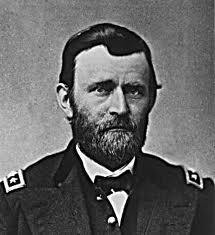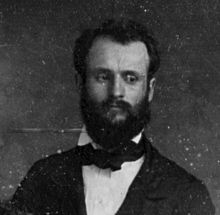 General Ulysses S. Grant was the perfect Chief Operating Officer of the United States during the Civil War and knew that War is really just big business. Grant had all the prerequisites that qualified him for this management roll. A single-mindedness of purpose and an unflinching ability to follow the dictates and whims of the power elite in Washington. Grant climbed the military ladder methodically, groomed by the press, vilified by some, worshiped by others. Humble, yet stealthy, General Grant walked that fine line between genius and sanity, sober and maybe drunk, it really didn’t matter, President Lincoln summed up Grant best, stating, “I can’t spare this man, he fights.”
General Ulysses S. Grant was the perfect Chief Operating Officer of the United States during the Civil War and knew that War is really just big business. Grant had all the prerequisites that qualified him for this management roll. A single-mindedness of purpose and an unflinching ability to follow the dictates and whims of the power elite in Washington. Grant climbed the military ladder methodically, groomed by the press, vilified by some, worshiped by others. Humble, yet stealthy, General Grant walked that fine line between genius and sanity, sober and maybe drunk, it really didn’t matter, President Lincoln summed up Grant best, stating, “I can’t spare this man, he fights.”
After the Battle of Shiloh, in 1862, General Grant had to regroup, he had found another social misfit, with political ties, General William T. Sherman. Grant’s and Sherman’s relationship would prove to hold them both in good stead during and after the war. The two general’s had several traits in common, however they both were able to determine a goal and do whatever was necessary to achieve it. In addition, their mentors and supporters in media, business and politics, counseled both in policy and diplomacy.
General Grant, surrounded himself with a staff, second to none, including John A. Rawlins. Grant knew many of his own shortcomings and realized that a brilliant man of Rawlins’ talents, ethics and loyalty, would serve as an excellent Chief of Staff. Rawlins was in effect the General’s alter ego, proofing all correspondence, general orders, debating policy, screening supplicants and ensuring Grant’s sobriety in the field. John A. Rawlins was also a political operative and an attorney from Illinois, who joined Grant’s staff with glowing references. The power brokers in the east, maintained a close relationship with Rawlins, that would ensure that the public image of Grant, would remain as untarnished as possible.
 Grant had no use for reporters, however, soon after Shiloh, Secretary of War Stanton dispatched Charles A. Dana, to shadow the General and report directly to the War Department, on Grant’s performance. Dana had a long and successful tenure with the eastern press and was held in political esteem by many in Washington. This War Department operative became one of Grant’s greatest benefactors, extolling his command virtues and reporting to Stanton and the press,
Grant had no use for reporters, however, soon after Shiloh, Secretary of War Stanton dispatched Charles A. Dana, to shadow the General and report directly to the War Department, on Grant’s performance. Dana had a long and successful tenure with the eastern press and was held in political esteem by many in Washington. This War Department operative became one of Grant’s greatest benefactors, extolling his command virtues and reporting to Stanton and the press,
General Grant is “modest, honest, and judicial, not an original or brilliant man, but sincere, thoughtful, deep, and gifted with a courage that never faltered. Although quiet and hard to know, he loved a humorous story and the company of his friends.”
Dana’s correspondence with Washington, regarding Grant’s military exploits, is regarded as a hallmark of the future President’s rise to national fame.
Lincoln and Grant had much in common. Grant did not possess the eloquence of Lincoln or the political savvy, but both men were humble in their own way. The General was the ultimate manager, making the tough decision, when nobody else would, willing to accept the human losses and carnage, in order to attain a goal. Bending, but not breaking to public and political leverage, knowing that his country’s ultimate victory depended on his decisions alone.
Big business dictates politics and policy, politics supports war. In order to support war, noble causes and public reinforcement is needed, the Civil War had two noble and worthy causes, Emancipation and Union. Lincoln, a heroic common man, had been elected President, favoring emancipation and abhorring the idea of secession, a perfect example of the corporate Chief Executive Officer, serving at the pleasure of the board and ensuring dividends to the stockholders. Grant, a heroic common man, had endured the necessary trials and tribulations of a meteoric career, becoming the commander of all the Armies of the Republic and the perfect Chief Operating Officer, his future guaranteed by his fame and knowledge that War is Big Business.
Bummer


It never fails to amaze me that Grant, seemingly a man with lots to be humble about, could show such a genius as a military commander. It also strikes me as a great personal tragedy that the Civil War was about the only professional event in his life that went well for him. He must have felt that way too since his memoirs end with Appomattox.
Louis,
Grant and Sherman could turn a deaf ear to the critics and wage the type of war necessary to win. If they weren’t backed in industry and politics their hands would have been tied. Grant lost his strong supporting staff after he left for Washington. All great Generals, as we have discusssed, are really only as great as the talent around them. That shield, allows the commanding officer to shine and eventually become a President. Those days are obviously gone, great military leaders of today, are wise enough not to expose their ethics or shortcomings to public, business and political leverage.
Bummer